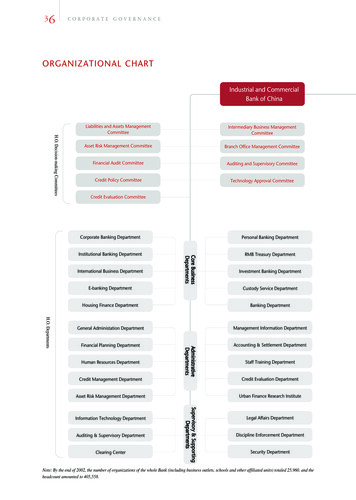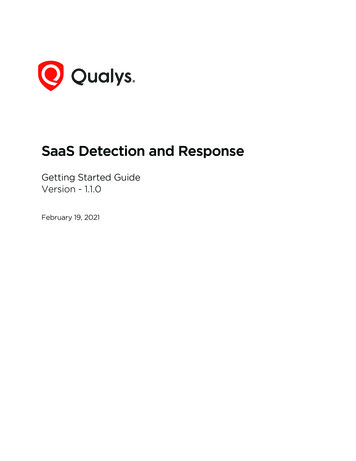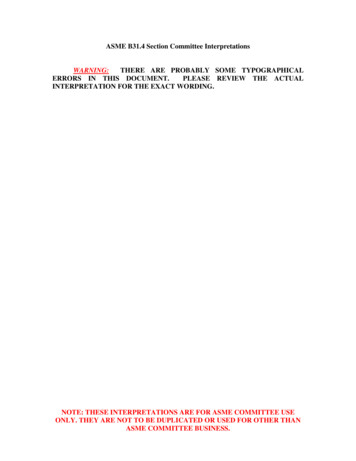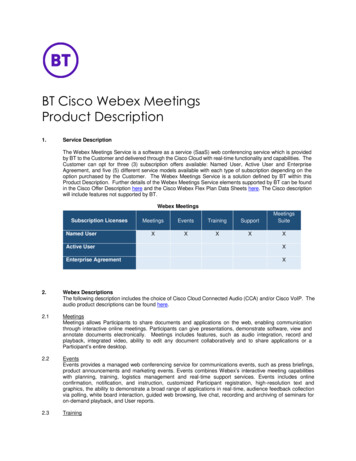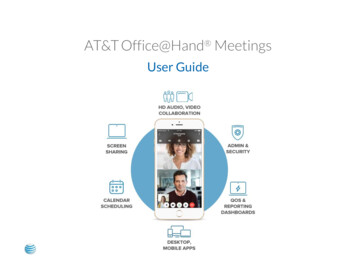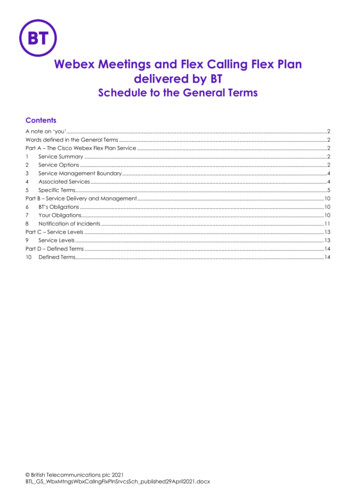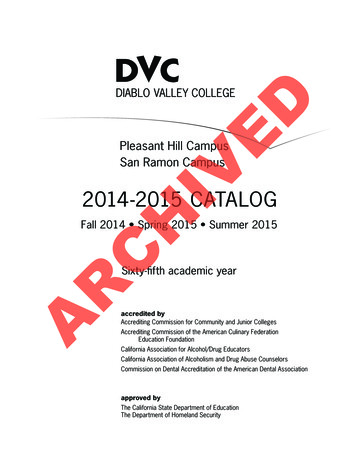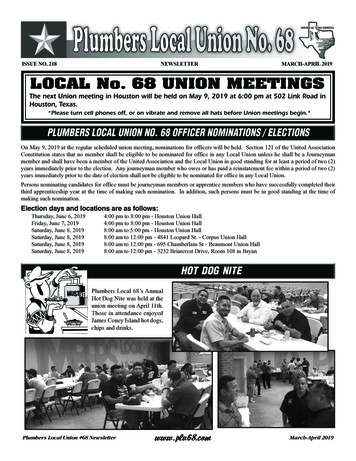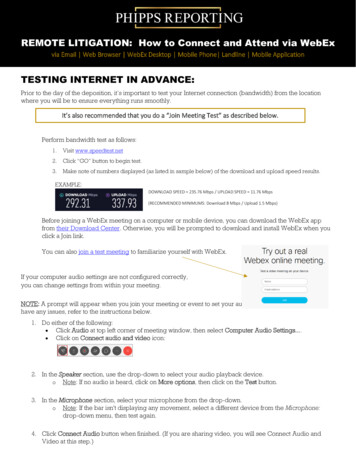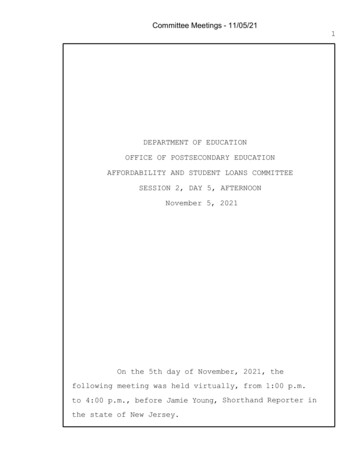
Transcription
Committee Meetings - 11/05/21DEPARTMENT OF EDUCATIONOFFICE OF POSTSECONDARY EDUCATIONAFFORDABILITY AND STUDENT LOANS COMMITTEESESSION 2, DAY 5, AFTERNOONNovember 5, 2021On the 5th day of November, 2021, thefollowing meeting was held virtually, from 1:00 p.m.to 4:00 p.m., before Jamie Young, Shorthand Reporter inthe state of New Jersey.1
Committee Meetings - 11/05/212P R O C E E D I N G SMR. TOTONCHI: Hello. Hello, everyone,welcome back from the lunch break. Let's dive right backin after a couple of announcements. First of all, I justwant to recognize the few folks that are at the tableright now, Rachelle, on behalf of four year publicinstitutions, Greg, on behalf of dependent students andEric on behalf of state attorneys general. If I'm missinganyone, please let me know before we get back into theIDR conversation. Just wanted to raise a quick pointregarding the caucus process that Josh referenced at theend of the morning session. Just for clarity. So we'reall on the same page in terms of the terminology of theuse of the word caucus. This is based on section 10 ofthe protocols. Caucuses are only those meetings that takeplace out of the public view during a full committeesession. So to the extent there are meetings that takeplace in the morning before the full committee session,during lunch or sometime between the October and Novembersession or the November December session, those are nottechnically caucuses. We just wanted to be on the samepage regarding what that is. That said, we do open theZoom meeting an hour early at, I believe, 9:00 a.m.Eastern every day. And if you would like any assistancewith creating a breakout room, we can help set up that
Committee Meetings - 11/05/213breakout room for you. Likewise, the same is true at thelunch hour or even after the session. And so, yeah, asense. Again, a caucus actually stops the main committeediscussion, so that would require the main committee tobe in session for a caucus. I see I have him. Just. Ithink so. There's actually-- the protocols that areinconsistent with one another because the protocols alsosay that a negotiator can call for a caucus at any timeand Section 10 doesn't explicitly say that a caucus can'toccur outside of the session, if that's theinterpretation that it's going to be adopted. And I wouldask for a vote, a consensus vote on modifying theprotocols to specifically allow for a caucus outside ofsession time in between sessions, as I proposed. So it'sthe position of the offenses facilitation team taking alook at particularly Section 10, a sentence that states acaucus stops the discussions of the fulfillment a caucusmust be taking place during the course of a fullcommittee session. So what you are suggesting would beit's our position. It would be inconsistent with theprotocols.MS. MACK: Emil, if I can addsomething to that, as well as took place outside ofsession, between session one and session two. It's myunderstanding that some of you, all of you at different
Committee Meetings - 11/05/214points did get together in what we would term workinggroups. There is nothing to prevent the committee membersfrom establishing those working groups and gettingtogether between session two and Session three, just aswas done between session one and two. The distinctionwith caucuses being during session and stopping this isthat the protocols call for facilitators to be availablefor those and we will during session but would not bebetween session two and three, just as we did not joinyou in those groups between session one and two as well.Back to you, Emil.MR. ROVENGER: Can I respond to theresponse to my point then please?MR. TOTONCHI: Go ahead.MR. ROVENGER: Thanks. I really don'twant to take up a lot of time on this because there's alot of substance to get back. But I do think one aspectof the caucus that's particularly important as comparedto a working group is that when you call a caucus, youcan call which representatives are going to be there. Andfrankly, we think it's particularly important to have asession in between session two and three that includesthe Department. And so I disagree with the interpretationof the protocols to the extent that's the interpretation.But I again, reiterate my request for a consensus vote to
Committee Meetings - 11/05/215modify the definition of caucus to include something inbetween sessions and to exclude the requirement thatfacilitators have to be there for that caucus.MR. TOTONCHI: Thanks. I'd be justrepeating myself at this stage, but thank you, Josh, forthe comment. David.MS. JEFFRIES: Emil, I think Brian hadsomething to add there.MR. TOTONCHI: Oh, my apologies. Goahead, Brian.MR. SIEGEL: Yeah. Just to respond toJosh, the Department can participate in those meetingsand we're open to participating in meetings withindividual parties. I mean, we've done that in the past.We're happy to talk to negotiators, either as a group oras individuals between meetings where we're under sometight time frames this year. So, you know, availabilitymight be a problem, but you know, we're open to talkingabout it. What we can't do during those meetings, itseems to me-- to be consistent with therole ofnegotiated rulemaking-- is to agree to certain language,because that really has to be done as part of the publicsession. But we can certainly talk about alternatives orwhat the goals are and things like that. It doesn't haveto be a formal caucus, so we remain open to that to the
Committee Meetings - 11/05/216extent people want to talk to us between the meetings.David? Yeah, so I feel like I get what Josh is pushingtowards, and I would definitely support that as the firstoption of having it more of an official meeting of thenegotiated rulemaking team be a caucus. If that ends upnot being possible, I would just offer a Chios resourcesin organizing and hosting the Zoom meeting or meetings inbetween. I do think it'll be important to haverepresentative representation from the Department in themeeting or meetings.MR. TANDBERG: And I do think I wouldrather a formal caucus, but if not, I can have staffsupport from SHEEO to facilitate scheduling and hostingthe Zoom meeting in between.MR. TOTONCHI: Thanks, David. Josh.MR. ROVENGER: Thanks, yeah. So Idon't I don't really I'm not tied to what it's called acaucus, whatever, I just. The big thing would be gettinga commitment from the Department to be there. And if thatdoesn't require a vote, that's great. A broad statementthat you know you're open to dates that wouldn't besufficient. And well, so I hear you on the point aboutspecific regulatory language. I do think that negotiatorshave asked a ton of questions and data and made a ton ofdata requests over the past few weeks. And given those
Committee Meetings - 11/05/217outstanding questions, I do think it would be helpfuljust to have conversations in the meantime. So again, Idon't know how we want to, how we want to frame it, but Iwould continue to reiterate my request for a vote if-.MR. TOTONCHI: Yeah, Josh, no Iappreciate that I'll just repeat one thing, Brian saidthat they are, but that is inclined to participate inthose working groups. One thing I do not want to do isspend time with everyone looking at calendars on the livestream. If folks would like to discuss, you know, afterthe session for a few minutes to see if something can bearranged, we can potentially do that.MR. ROVENGER: Totally agree. I dothink there's a distinction, though, between inclined toparticipate and a commitment to participate, subject toworking out the scheduling later on.MR. TOTONCHI: Thanks, Josh. Daniel.MR. BARKOWITZ: I'll just note,though, that any of the solutions we're proposing losesthe ability of the public to observe. And so this isobviously a fit or a gap measure. Ideally, we could addanother week. I understand the concern of the feds andthe calendar, but I would also love, if possible, for usto add some time or either in hours or days, so that thepublic can participate as well as needed and observe as
Committee Meetings - 11/05/218needed. You know, the back channel negotiations areimportant, but also the public perspective is important.MR. TOTONCHI: Thanks, Daniel Brian, Isee your hand went up.MR. SIEGEL: Yeah. I just wanted tosay that I can confirm that based on scheduling will be.So you let us know. Give us some options and we'll haverepresentatives from the Department at meetings. Now somepeople may want to meet without us if you have particularissues among different negotiators that you want to talkabout. That's fine, too. But if we're invited toparticipate, will be there going. Also noting that as hasbeen said, to the extent this is a public process, so alot of this discussion and what we've done in the past isto during the formal sessions, then kind of summarize,have somebody summarize those private conversations thatwere going on if they reached any just to so that's onthe public record as well.MR. TOTONCHI: Justin.MR. HAUSCHILD: Thanks. And I don'twant to offer this as the alternative that's morepreferable to what Josh is proposing, whether it be acaucus or a working group, but just along the lines ofwhat some folks have been talking about it as thispotentially being outside the public's view. You know,
Committee Meetings - 11/05/219I'm curious whether the Department might be amenable toadding another day, and I understand their concerns aboutsending. And I think discussion has been largely aboutadding days after the third session, but whether theDepartment would consider adding a formal session betweennow and what is currently the third session, in additionto maybe a working group or caucus. I don't know exactlyhow much time we need here, but I think that also workshere some of the issues around the working group orcaucus happening outside public view. It would also giveus additional time to work, I think closely alongside ofwhatever happened in the working session or caucus. Sothings aren't lost between then and the third more. Whatmight be the fourth session, I guess, at that point. So Ijust be curious what the Department's position is onthat, since it wouldn't technically be extending thetimeline.MR. TOTONCHI: Jennifer.MS. HONG: I just I have difficultyjust if I saw a possibility to make that happen. I know.I don't want to belabor the point on all the logisticsthat have to occur in terms of making this public spaceavailable in terms of all our contractual agreements witheven our facilitators. So I just I don't see that asbeing a possibility, which is both on the back end or in
Committee Meetings - 11/05/2110between. If we're happy to meet with you all as Brian,within the framework that Brian provided to the extent, Ithink we can certainly move things forward in terms ofdiscussing general, clarifying the issues and kind ofgetting answers out, but keeping our negotiations for thepublic domain. We can't officially add more time at thispoint.MR. TOTONCHI: Thank you all so muchfor the discussion and for the problem solving. So withthat discussion, first of all, I want to recognize thatJoe is coming back for state attorneys general so welcomeback Joe. And with that, unless Jennifer, we have otherbusiness. I believe we are going to resume with our IDRdiscussion. So, Jennifer, I know you presented some ofthe updated work that the Department that the Departmentdid right before lunch. But if you could just help teethis up and then we can get feedback.MS. HONG: Sure, thank you, Neal. Weleft off here and I realized I needed to tee up thisinterest subsidy issue. I believe we left with, I thinkJoe and Persis Yu having some comments about interestsubsidy. So remember, as you're going through thisdocument, through this proposed tax, remember that we'restreamlining all the language. So we've taken basicallyfour different sections and collapsed them into one. And
Committee Meetings - 11/05/2111then you have to read it to see which plan is applicablefor each proposal. So for under interest subsidy, whatwe're proposing and I can just briefly summarize rightnow, basically, there's no, under IDR, there's nointerest subsidy for IBR. If the calculated payment doesnot cover all interest, the government pays remaininginterest for three consecutive years. So that's where thethree years, excluding periods of economic hardshipdeferment from repayment, start. So that's where thethree years comes from. That's only for IBR pay as well.Pay has the same interest subsidy as IBR, the three yearsfor three consecutive years. REPAYE for REPAYE onsubsidized loans, if the calculated payment does notcover all interest, the government pays remaininginterest for three consecutive years, but on subsidizedloans after three consecutive years, and on unsubsidizedloans during all periods. If the calculated payment doesnot cover all interest, the government pays half of theremaining interest. And you'll see under--If you canscroll, scroll down to five. And. See? Yeah. To the nextpage, I'm sorry for IDR. The plan that we're proposinghere, what we're proposing, and again, this is T.K. Sowe'd like your feedback on that, if the payments are 0,a percent is subsidized. So the TK is, you know, theperson, and if you had feedback on that, but that that is
Committee Meetings - 11/05/2112EIC, our proposal, the whole discussion about the three,the applicability of the three years that those are basedon existing plans. So we're not proposing that or IDR.It's actually a percent.MR. TOTONCHI: I just want torecognize Persis is back at the table for legal aid.Michaela.MS. MARTIN: I think that or it shouldbe one hundred percent of interest is not charged to theborrower if they're at extremely low income right now,the proposition is listed as one hundred and fiftypercent of, you know, poverty line. Even if we increasethat, if you have a zero payment like you cannot makepayments and interest is accruing like, then you're justwatching your balance go up. Right? Versus I think sincenegative interest rate, the really should be paused ifyou have a zero payment. And then I also just wanted toask like, I know that this is being proposed for thecurrent plan, but do we have any availability to consideror to modify the interest subsidy on any of the otherplants?MS. HONG: That's not what is on thetable. For this negotiated rulemaking, we're trying topropose a new plan. So we hadn't proposed any substantivechanges to existing plans.
Committee Meetings - 11/05/2113MR. TOTONCHI: Daniel.MR. BARKOWITZ: So in the interest ofagain, using Bobby's quote of making the best plan themost awesome, I believe, he said, I forgot the directquote before lunch. The plan to be all end all foreveryone. I would strongly urge agreement with what youjust heard from Michaela that we that we use 100 percentsubsidy for zero. But I actually love to see a 100percent subsidy for anyone who doesn't pay in full theirinterest so that in effect, again, I go back to theDepartment's white paper at the start of this process.You asked a question about concerns around students whosee their balances grow. That is true for students whohave a zero dollar payment. That is also true forstudents who have a payment that is less than the monthlyrequired payment or required payment for interest. So aswe've seen and as we've heard, growth of balance is ahuge disincentive to continue to make payment. So I wouldsupport the idea of making any unpaid interest subsidizedeach month. And I would at minimum, if that's notpossible due to modeling or scoring, then I would at theminimum suggest modeling off the REPAYE that half theinterest would be subsidized as a floor. And I don't seeany of that language in the EICR section. All I see isfor zero dollar. So I wouldn't want to be worse than
Committee Meetings - 11/05/2114what's currently out there for REPAYE. But again, mystrong preference is to have all of it subsidized if theinterest is not paid.MR. TOTONCHI: Thank you, Daniel. I doalso want to mention that Marjorie is back from four yearpublic institutions. Carol.DR. COLVIN: I know that we'rediscussing the interest subsidy, however, going back topayments, any interest charged to the borrower,preferably zero percent for those with a zero payment.Understanding that the initiative that we're trying toget to is controlling the growth of the outstandingbalance would be best served by looking at applying anypayments made while they're on this FEMA plan toprincipal first, we get the same outcome. We're able tocontrol that and then they're actually knocking down thatbalance, which would grow at a reduced rate no matterwhat the interest charged would be, just to bring thatback up.MR. TOTONCHI: Anymore comments on Gthrough J of the document? If not, at this stage, oh,Jennifer, go ahead.MS. HONG: Just I know we're about totake a temperature check, what I'm hearing is apreference for 100 percent of the interest subsidy, if
Committee Meetings - 11/05/2115not that something equal or better to repeat what wecurrently offer. So if we could just take that, that's tocome, if we could take that off the table for thetemperature check. And if you guys just look at theother, the proposed language for everything else andtaking the temperature check.MR. TOTONCHI: Does everyoneunderstand that? So we're taking a temperature. Okay,Bethany, you're shaking your head,MS. LILLY: Would you encapsulate forus, Emil?MR. TOTONCHI: Yeah. So as Iunderstand it regarding this one, one hundred percent,take that idea and put it to the side for now. And we'reasking for a temperature check on everything else in G.G, G through J. Except for that specific issue. Did Iaccurately capture that, Jennifer? And if there's anyoneconfused, I'll ask Jennifer to tee it up again.MS. HONG: Yeah, that's right, Emil.So again, we've made significant changes to streamlinethese regulations, I realize we don't have a side byside, but that's what we're temperature checking on howwe communicated that.MR. TOTONCHI: So at this stage, letus see. Let's take a temperature check on with the one
Committee Meetings - 11/05/2116exception regarding the 100 percent issue. Let me seethumbs. Okay, I see everyone is at a minimum sideways.Thank you for the feedback. Alright, excellent. I supposewe should continue proceeding through IDR, Jennifer,would you like to tee up the next part, section K?MS. HONG: Sure. Section K is onforgiveness. I think actually we're going to get atemperature check just on Kay, Okay, it's on forgivenessand what we're proposing under the new-- the proposed-- Isee our Plan B IDR is for loans being repaid. Under theplan, we received for undergraduate study. The remainingbalance forgiven after 20 years of qualifying repaymentand four loans being repaid under the plan that werereceived for graduate or professional study. Theremaining balance forgiven after twenty five years ofqualifying repayment similar to REPAYE. I know we'vestarted this discussion, but we can continue it here.MR. TOTONCHI: Thank you, Jennifer.Joe.MR. SANDERS: Hi, thanks. So a coupleof concerns here, but I'm going to focus on one that is aprimary interest for state AGs first and then I thinkothers are probably comment on other stuff that I cancome back or get in the chat. On the payments that countstate AGS have uncovered significant evidence of
Committee Meetings - 11/05/2117forbearance, steering servicers that steer people intoforbearance. And although this current proposal wouldcount administrative or mandatory administrativeforbearance, servicers are steering people into voluntaryforbearance. Are in many instances and so. We think thatthere needs to be some kind of accounting for that. Youknow, I haven't seen any fix for this elsewhere in theneg reg. I don't have the details on what theDepartment's new servicing contracts are going torequire, but history suggests that this is not a problemthat's just going to disappear. And so, you know, stateattorneys general want to see some way to account forforbearance theory. Now there was an interesting proposalthat Suzanne put into the chat on the Public Service LoanForgiveness session this week. Um. It was put forward bythe Student Borrower Protection Center. And there was aconsideration in that in that issue paper thatforbearance, voluntary forbearance is be considered asqualifying for purposes of public service, loanforgiveness, where there have been investigations orlawsuits or settlements by state or federal agencies. Andwe think that is provides a real potential for anevidence-based look back of the type that the Departmenthas already done in the Massachusetts versus FIA case.And we think that there's a real opportunity to include
Committee Meetings - 11/05/2118that concept not only in Public Service Loan Forgiveness,but here in K. We'd love to hear the Department's take onthat idea and we are preparing proposed language tocirculate. We've got it substantially. We've got a draftand we're going to send it out soon. But we want to putthat forward for negotiators to discuss and want to putthat forward for negotiators to discuss and for theDepartmentsMs. YU: So I 100% agree with Joe, andI actually am going to come back to this point a littlebit later because I have a lot to say on this particulartopic, but I do want to just be even a little bit morebroad and say that I think again, we have an opportunityto radically be better for borrowers and have a bettercancelation provision in our Income Driven Repayment. Ithink there are two things that I put forward in theproposal with regards to cancelation that I submitted tothe Department earlier this week. One is that we need todo cancelation periodically. One of the problems withIncome Driven Repayment is that it is an all or nothingproposition. And borrowers are seeing their balances growfor this entire time frame. They're not seeing anyreduction. There's a feeling of hopelessness, especiallyfor folks who have balances that are negativelyamortizing. They need to see it their credit as being
Committee Meetings - 11/05/2119impacted. They have no there's nothing helping their debtto income ratio if they're trying to purchase a home orfinance a car. So holding on to this debt with this allor nothing cancelation approach just doesn't work. And Ithink it's why we see that of the four and a half millionborrowers who have been in repayment for more than 20years, only thirty two borrowers have ever receivedcancelation. It's an unacceptable rate of cancelation,and we need to radically structure how we do cancelationdifferently so that people really can see progress. Sothat's my first proposal is that we need to seecancelation periodically. The second proposal that we putforth is a way to target the cancelation by borrower'sincome. So we have suggested that you have some kind ofscale. I'm a lawyer, not a mathematician. So I suggestsomebody else come up with what the scale should be. Butfor the lowest income borrowers, we should not have thempaying for this length of time. I suggest looking atborrowers who have one hundred and fifty percent offederal poverty for three years have cancelation at sorryat 150 percent of poverty debt cancelation after threeyears. And I think we do this mathematically through aformula that you can create and have that cancelationhappen, either at that time frame or have it happenannually. But to the lowest income, borrowers have it at
Committee Meetings - 11/05/2120three years and the highest income borrowers have it at15 years. And that way you're able to target thecancelation, but you don't have folks in zero income zero 0 IDR payments over and over and over again, just goingthrough the hoops of recertifying their income whenthey're really not, they're not making payments. We knowthat they're low income. We know that we're going tocancel their loans, and a lot of them fall into default,frankly, because they can't jump through the hoops. So weneed to lower the hoops. And so I've submitted a proposalon how we can do that. If there's any interest, I amhappy to come up with language of it, but I would likesome feedback before actually drafting the law. Thankyou.MR. TOTONCHI: Thank you. I want torecognize Jen is present for student borrowers. Michaela.MS. MARTIN: The opportunity, ifsomething such as like a proportion ongoing (inaudible)versus proposal is something that's on the table at all.MS. HONG: I'm sorry, Michaela, couldyou repeat that first part, I just, could you repeat yourquestion?MS. MARTIN: Yeah, the Persis isasking if there's potential that we could have, you know,kind of incremental forgiveness rather than an all or
Committee Meetings - 11/05/2121nothing approach. And I was wondering if that issomething that is on the table for discussion before Imake my (inaudible).MS. HONG: We haven't reached adecision on that. We're still contemplating it, but it'snot in the proposed language before you. We just needsome more time.MS. MARTIN: Okay. As far as thiscurrent timeline being twenty five or twenty years, Icannot wrap my brain around it that this is a literallifetime of debt that disproportionately affects peopleof color and folks that are extremely low income. Right.This not only affects your ability to buy a house, buteven getting an apartment right, like being able to haveyour credit rent to get a car, even a used very lowbudget transportation. This affects any kind of economicmobility, as you're having to think about what this debtthat you're carrying around for 20 to 25 years becauseyou went to go get an education. We currently have astudent debt crisis. Like, I can't say that enough, likewe are in crisis like folks that went to school and havethis debt need a way out. And so I, I strongly propose 10years. Ten years to forgiveness. And the way that this iswritten right now is that it's lumped in with REPAYE andPAYE. So I don't know if that's something that we can
Committee Meetings - 11/05/2122just swap it out for both of them or if this would needto be redrafted specifically for the EICR. But how low isthe Department willing to go and why are we still lookingat 20 to 25 years of debt? And again, particularlyacknowledging, and I'll put in the chat, how this affectsintergenerational and economic mobility, right? Not juststudent parents who are in school, but 20 to 25 years. Ifeel like a lot of people have kids in that time who thenare having to take care of their kids and think about howthey're saving for college for their kids while trying toget out from underneath the debt that they also have. Iknow I'm probably running short on time, but the storiesand of how much this affects folks being stuck in anapartment paying more than they would if they had amortgage and then looking at what this is doing to ourhousing crisis, particularly down here in SouthernCalifornia. Not only are they super expensive, but youcan't even get a mortgage with this level of studentloans like. I just I just can't conceptualize 20 to 25years still in our current situation.MR. TOTONCHI: Jennifer, go aheadplease.MS. HONG: Thank you for that. I justMichaela, we, I hear your comment and we're listening tothat. I know you're pushing for 10 years, to the extent
Committee Meetings - 11/05/2123that you know, any timeframe or any numbers we putforward, you know, finding some kind of rationale orsupport for that certainly helps.MS. MARTIN: I think that Persis hasbetter rationale for her three and seven yeardistinction, because studies show that after three yearson a zero income, the odds of you recuperating that moneyis incredibly low. And for other consumer lending, sevenyears is the standard. So I thought that 10 years is mecoming in with a reasonable, rational proposal andsplitting the difference between 20 and 7 and 3. Likethat that is the rationale is that this is far beyond anyother consumer lending practice and like ten years modelsa standard plan, if the standard is that you're out ofdebt in 10 years, then that should be the standardregardless of if you're in poverty or not.MS. LILLY: So I want to build onMichaela's point with a really concrete example for mypopulation and for older adults/seniors. You can if youend up in default, you can have your Social Securitybenefits offset, which means the fixed income that youare living on gets taken away from you. In fact, you canbe left with only seven hundred and fifty dollars a monthto live on. I don't think anyone on this entire Zoom callcould come up with a way to live seven hundred and fifty
Committee Meetings - 11/05/2124dollars a month. And so these are the folks who are goingto be in 0 for repayment plans. These are the folks whodon't have any flexibility when it comes to their incomebecause they're on Social Security Disability benefits ortheir seniors living on very limited Social Security. Imean, seven hundred and fifty dollars is less than SSI,less than the program that we give financial support tothe lowest income seniors and people with disabilities inthis country. And the fact that, you know, we're going tocontinue to garnish those folks' stuff and not give thema route out of default is incredibly frustrating to me.But like, I think one way we can prevent that is we canset up much more reasonable proposals like Persis'sproposal. Like, I cannot talk today. We can go with otherproposals that are much more reasonable. They're going toprotect these low income borrowers that have massivelifetime impacts if this debt continues. I also want totouch on which payments because I really appreciatedJoe's comments earlier about this. We've heard publictestimony, all of these basically every single time we'vetaken public testimony during these sessions of peoplewho get a forbearance that they weren't intending to getinto that has implications for things. I, especially withall the evidence of forbearance steering, especially withall of that, I really would recommend that payments under
Committee Meetings - 11/05/2125for any type of forbear
breakout room for you. Likewise, the same is true at the lunch hour or even after the session. And so, yeah, a sense. Again, a caucus actually stops the main committee discussion, so that would require the main committee to be in session for a caucus. I see I have him. Ju
